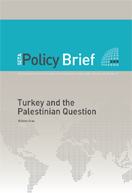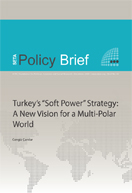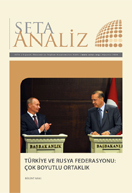The Constitutional Court ruled not to close down the AK Party, relieving Turkey from an unprecedented level of political uncertainty, social and economic turmoil, and potential chaos. Instead, the court chose to keep the ruling party under close scrutiny by declaring it “a focal point of anti-secular activities,” and imposing financial measures.
The Constitutional Court ruled not to close down the AK Party, relieving Turkey from an unprecedented level of political uncertainty, social and economic turmoil, and potential chaos. Instead, the court chose to keep the ruling party under close scrutiny by declaring it “a focal point of anti-secular activities,” and imposing financial measures. Leaving the closure case behind the ruling party is expected to be more restrained, and to act responsibly as demonstrated during the proceedings of the case, while trying to strengthen its democratic and secular credentials through a reform policy in keeping with the EU accession process. The verdict may also have some ramifications on the opposition. It highlights the limits of the Constitutional Court to be a focal point of opposition against the AK Party. Having lost their hope that the AK Party could be toppled by the court or by pressure from the military, the opposition parties, especially the CHP, may be forced now to develop more down-to-earth policies instead of relaying on a mere secularist discourse against the AK Party within the political sphere.
*** The Constitutional Court decided not to close down the AK Party, relieving Turkey from an unprecedented level of political uncertainty, social and economic turmoil, and potential chaos. Instead, the court, as the bastion of the Kemalist/secularist establishment, chose to keep the ruling party under close scrutiny by declaring it “a focal point of anti-secular activities,” and imposing financial measures. The end of the closure case, though dispersed a significant degree of uncertainties raises numerous questions: What does this verdict mean? How will the AK Party respond? Will the verdict paralyze the party, preventing it from deepening political reforms – or prompt a new wave of reforms? What will be the repercussions of the verdict on the opposition parties? Will it contribute to a reconciliation in Turkish politics or will it worsen political tension and division over the way “secularism” is understood and debated?
The background On March 14 2008, the chief prosecutor of the Court of Appeals asked the Constitutional Court to close the ruling AK Party on the grounds that it had become a “center of anti-secular activities,” and also demanded a five-year political ban for 71 current and former members of the AK Party, including prime minister Recep Tayyip Erdoğan and president Abdullah Gül.
The indictment, compiled from media reports and Google searches, brought together statements of party officers on various political issues. It concluded that the AK Party intends to erect an Islamic state by undoing Turkey’s secular characteristics. The hardest evidence cited by the public prosecutor in the indictment was a constitutional amendment initiated by both the AK Party and the Nationalist Action Party which was approved by 411 out of 550 members of parliament. The amended articles of the constitution were intended to lift the ban on the usage of the headscarf in universities by broadening the constitutional principles of equality and the right to education. Filing a case against the ruling party caused strong international reactions, particularly from the European Union. EU officials warned that closure of the AK Party could result in the suspension of accession negotiations with Turkey. European Commission President José Manuel Barroso stressed that the closure of the AK Party was unacceptable in the context of EU values and principles and that it would jeopardize the whole accession process. EU Commissioner for Enlargement Olli Rehn









